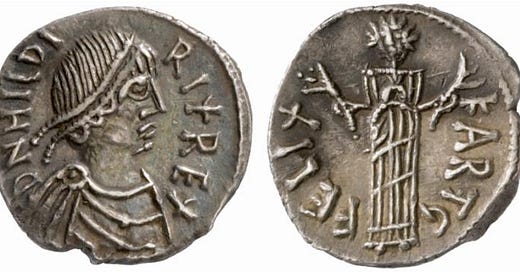Below are a small selection of poems from Vandalic North Africa, which have been passed down to us through the Anthologia Latina. The numbers beside each poem follow Riese’s numbering in his edition of the AL. I have selected a small number out of a far greater one, with the hope to briefly provide some slices of Vandalic North African life.
Incerti Carmina — Poems of an Unknown Author
These poems may be of different authors, or indeed of the same author. I am inclined to believe that they are the work of a single author operating in Vandalic Carthage, based on their grouping in the ms. and especially because there exists poems in this grouping on new baths, which mirror that poem of Felix below, as well as a poem “On an Arzugitan Poet”, which ostensibly suggests a poet from the Tripolitana region (for more on this placename, cf. Neri 2009).
100. On a temple of Venus which was destroyed to build walls
The wonders of a temple are felled by old picks,
and the hallowed halls prostrate for the use of war.
For what stones are tumbled from the overthrown columns,
these are soon to be relocated into the parapets of walls.
Mars seizes the savings of his rejected love:
now Venus searches through city walls for her shrines.150. On a painting
This face, which the black canvas wears, which a brief line records clearly; the painter soon ruling over divers colors, so very skilled in his practiced art; he fashioned a resemblance, seeming true, a trickster faithfulness for his fitting figures, that, whatsoever he should paint by hand, you’d believe to have bodily sense.
178. On the baths of a particular pauper
A life meager in means, but dexterous in a little dirt,
shed some comforts with an aping command.
And his fertile garden smells of its esculent birth,
for he has erected a new bath in some narrow land.
What nature denies, diligence brings forth in things small.
That which the pauper has, the rich scarcely at all.Felicis Carmina — The poems of Felix
Felix was a rather lousy poet, scarcely better than deaf in matters of meter, and often his poems are diffuse, obscure and poorly linked by a single consistent chain of thought. However, he wrote most explicitly on the Vandals and appears to have written for the Vandal court under Thrasamund (regnat 496-523) and later Hilderic (r. 523-533). The above poems of uncertain authors are doubtlessly superior to each of these, but I still thought to include them for their historical intrigue.
210 On the Baths of the Alans
Here where the statues now shine with illustrious metals
and the bright work flashes with glittering marble.
The dry earth was parched with dusty grasses
and the sand of the beaches was worthless.
But he who led towers into the great sky,
showing that stones run on stooping ridges,
King Thrasamund vowed public joy to the people,
connecting the prosperous ages with his charge.
He birthed clear waters with his orders and a new style;
and a sweet wave washed forth the new fountains.
Vulcan was frightened that the baths were raised so quick,
that he himself subdued the flames with a nervous hand211 On the same subject, differently
It is unclear to me whether the below poem ought to contain sexual innuendo, so I’ve left it as obtuse as it reads at first glance.
The noble architecture of Baiae leaps up in the baths
and the lengthened day doubles the light-rays on the mountains.
King Thrasamund executed this work in this one year,
giving his famous works to the people for all seasons.
Here abounding virtue is revived in breathless old men,
here the lively baths nurse their tired joints.
Heat is readily stirred by common waters,
and a near fire affects icy rains.
Here a flame is beneficial, and feeds not on one's strength,
and warmth is greater desired through new vows.
A more tedious worry of diseases leaves behind the sick,
and he who is soon to die does not wash in the glassy waters.215 On Hilderic’s Palace at Anclae, Carthage
Powerful king of the Vandals,¹ heir of a dual crown.² you adorn your own name through great deeds done. Avenger Theodosius mastered the martial lines, restoring the captive peoples with an easy engagement. His enemies with quiet arms Honorius subdued, whose greater prosperity conquered so strongly. The ample virtue of Valentinian³ is known to the world shown by his handed-over enemies in the work of his grandson.⁴
¹Hilderic (Latin text reads Vandalirice ie. Vandaliricus)
²On the surface, presumably because the Vandal kingdom in Africa was officially the Regnum Vandalorum et Alanorum ie. The Kingdom of the Vandals and Alans. Perhaps more prudently, it may refer to that of a Vandalic Rome which Hilderic may have seen himself as an heir to and the Vandal Kingdom. Given the matter of the poem, the latter may be preferred.
³Valentinian III
⁴Hilderic — through Eudocia, Valentinian III’s daughter.


